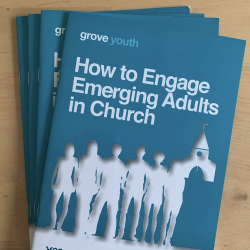
Rebecca Glover works for Youth for Christ as their digital comms coordinator. She's recently published a booklet with Grove about engaging emerging adults in church, which discusses authenticity, community, serving, attraction, and intentionality. We asked Rebecca to write a blog about the key findings of the research and how you can find out more...
At nineteen years old I felt like I didn’t fit into church. I had spent almost the entirety of my life so far experiencing church only from inside a childrens or a youth group; learning key Biblical stories and relevant life-lessons through dramas, discussion, crafts and games, surrounded by people in the same age-stage as me. But here I was, fresh out of Sunday School, experiencing a very different church to what I was used to.
Recent stats show that this is a shared experience amongst emerging adults today. And so, I have written a Grove booklet titled How to Engage Emerging Adults in Church. That phrase, “emerging adults”, is widely argued, but generally means the ages of 18-25.
ATTRACTION
The first key theme that comes out is ‘attraction’ and, after briefly discussing whether it’s okay to be attracted to a church - that consumer-culture conversation - I look at some of the things that emerging adults may be attracted to. LED lights, smoke machines and pop-worship in a warehouse is often a stereotype we assume emerging adults crave, but relevance, authenticity, sung worship and relevant teaching were all attractive elements of church, said emerging adults.
CREATING COMMUNITY
The second theme I look at is the significance and importance in ‘creating community’. Spot passions, empower emerging adults to serve, invite them to join small groups, hold socials. A Young Adults Curate I spoke to said, “remember the power of home”. Many emerging adults in your context may have recently moved, and so to feel at home in church is significant. “Home can be achieved through belonging, creating community, and practically, by having meals around the table”.
CRITICAL MASS
Thirdly, I discuss critical mass; a theme that links with others in the booklet. Critical mass is cultivated through community and with intentionality. Through community, emerging adults are invited to belong before they necessarily believe. In this chapter, I provide a Freshers Guide for church contexts in a University city to aid critical mass.
INTENTIONALITY
Finally, I explore the theme of intentionality. Sometimes we see emerging adults as enigmatic, but church leaders need to take responsibility for this ‘missing’ generation. Youth pastors should take responsibility for the young people that will grow up to be young adults. This could be done by having young people regularly sit in the service, and debunk the idea of ‘adult church’. When speaking from the front, use language that involves and is relevant to emerging adults. Know your locality, utilise social media. Within this chapter, I include a social media guide as well as focus group questions for leaders.
This booklet doesn’t provide all the answers. It is less than thirty pages and it won’t be relevant to every church context, but I hope that it begins a conversation, asks the right questions, and points you in the right direction.






